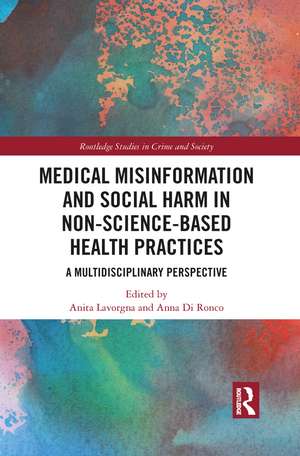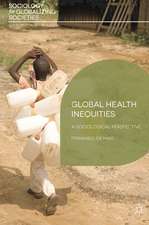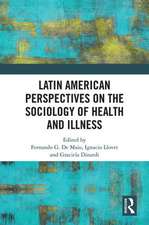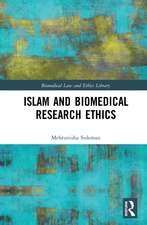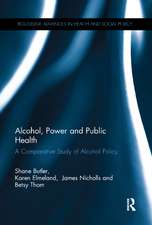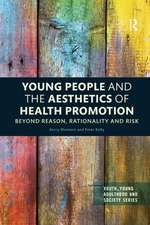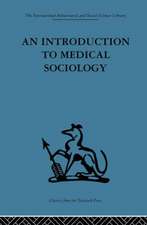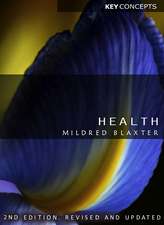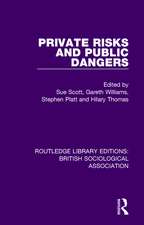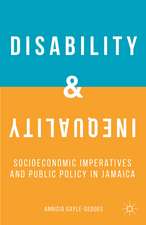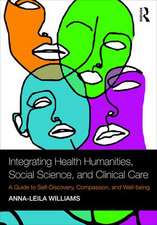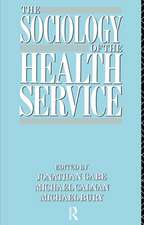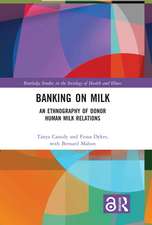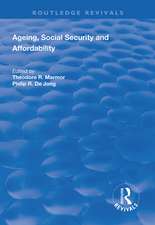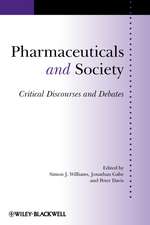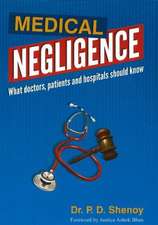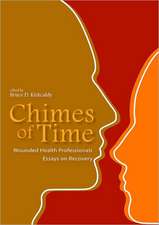Medical Misinformation and Social Harm in Non-Science Based Health Practices: A Multidisciplinary Perspective: Routledge Studies in Crime and Society
Editat de Anita Lavorgna, Anna Di Roncoen Limba Engleză Paperback – 30 iun 2021
developed outside science-based medicine have boomed in recent years, especially due to
the commercialisation of cyberspace. The latter has played a fundamental role in the rise
of false ‘health experts’, and in the creation of filter bubbles and echo chambers that have
contributed to the formation of highly polarised debates on non-science-based health
practices—online as well as offline.
By adopting a multidisciplinary approach, this edited book brings together
contributions of international academics and practitioners from criminology, digital
sociology, health psychology, medicine, law, physics, and journalism, where they critically
analyse different types of non-science-based health approaches. With this volume, we aim
to reconcile different scientific understandings of these practices, synthesising a variety
of empirical, theoretical and interpretative approaches, and exploring the challenges,
implications and potential remedies to the spread of dangerous and misleading health
information.
This edited book will offer some food for thought not only to students and academics
in the social sciences, health psychology and medicine among other disciplines, but also
to medical practitioners, science journalists, debunkers, policy makers and the general
public, as they might all benefit from a greater awareness and critical knowledge of the
harms caused by non-scientific health practices.
| Toate formatele și edițiile | Preț | Express |
|---|---|---|
| Paperback (1) | 382.91 lei 43-57 zile | |
| Taylor & Francis – 30 iun 2021 | 382.91 lei 43-57 zile | |
| Hardback (1) | 1000.27 lei 43-57 zile | |
| Taylor & Francis – 23 oct 2019 | 1000.27 lei 43-57 zile |
Din seria Routledge Studies in Crime and Society
-
 Preț: 281.03 lei
Preț: 281.03 lei -
 Preț: 282.33 lei
Preț: 282.33 lei -
 Preț: 289.93 lei
Preț: 289.93 lei -
 Preț: 311.41 lei
Preț: 311.41 lei -
 Preț: 385.00 lei
Preț: 385.00 lei -
 Preț: 293.25 lei
Preț: 293.25 lei -
 Preț: 308.75 lei
Preț: 308.75 lei -
 Preț: 308.78 lei
Preț: 308.78 lei -
 Preț: 294.19 lei
Preț: 294.19 lei - 20%
 Preț: 279.06 lei
Preț: 279.06 lei - 9%
 Preț: 934.76 lei
Preț: 934.76 lei - 9%
 Preț: 935.91 lei
Preț: 935.91 lei -
 Preț: 346.90 lei
Preț: 346.90 lei -
 Preț: 437.34 lei
Preț: 437.34 lei -
 Preț: 469.34 lei
Preț: 469.34 lei -
 Preț: 469.34 lei
Preț: 469.34 lei -
 Preț: 430.37 lei
Preț: 430.37 lei -
 Preț: 384.59 lei
Preț: 384.59 lei - 18%
 Preț: 997.11 lei
Preț: 997.11 lei - 18%
 Preț: 996.33 lei
Preț: 996.33 lei - 18%
 Preț: 1108.42 lei
Preț: 1108.42 lei - 18%
 Preț: 1006.60 lei
Preț: 1006.60 lei - 14%
 Preț: 325.34 lei
Preț: 325.34 lei - 18%
 Preț: 1056.00 lei
Preț: 1056.00 lei -
 Preț: 348.77 lei
Preț: 348.77 lei -
 Preț: 240.38 lei
Preț: 240.38 lei - 12%
 Preț: 312.43 lei
Preț: 312.43 lei -
 Preț: 277.78 lei
Preț: 277.78 lei - 18%
 Preț: 1009.55 lei
Preț: 1009.55 lei - 13%
 Preț: 336.90 lei
Preț: 336.90 lei - 18%
 Preț: 1001.84 lei
Preț: 1001.84 lei - 20%
 Preț: 1104.66 lei
Preț: 1104.66 lei - 18%
 Preț: 1051.55 lei
Preț: 1051.55 lei - 20%
 Preț: 1048.59 lei
Preț: 1048.59 lei -
 Preț: 409.90 lei
Preț: 409.90 lei - 12%
 Preț: 325.34 lei
Preț: 325.34 lei - 18%
 Preț: 1161.10 lei
Preț: 1161.10 lei - 26%
 Preț: 764.77 lei
Preț: 764.77 lei - 20%
 Preț: 1042.80 lei
Preț: 1042.80 lei
Preț: 382.91 lei
Nou
Puncte Express: 574
Preț estimativ în valută:
73.27€ • 76.70$ • 60.63£
73.27€ • 76.70$ • 60.63£
Carte tipărită la comandă
Livrare economică 07-21 aprilie
Preluare comenzi: 021 569.72.76
Specificații
ISBN-13: 9781032087535
ISBN-10: 1032087536
Pagini: 204
Dimensiuni: 156 x 234 x 11 mm
Greutate: 0.29 kg
Ediția:1
Editura: Taylor & Francis
Colecția Routledge
Seria Routledge Studies in Crime and Society
Locul publicării:Oxford, United Kingdom
ISBN-10: 1032087536
Pagini: 204
Dimensiuni: 156 x 234 x 11 mm
Greutate: 0.29 kg
Ediția:1
Editura: Taylor & Francis
Colecția Routledge
Seria Routledge Studies in Crime and Society
Locul publicării:Oxford, United Kingdom
Public țintă
Postgraduate and UndergraduateCuprins
1. Introduction Anita Lavorgna and Anna Di Ronco; 2. Towards a better criminological understanding of harmful alternative health practices: a provider typology Anita Lavorgna and Heather Horsburgh; 3. Science denial: psychological processes underlying denial of science-based medical practices Sara Prot and Craig A Anderson; 4. Understanding the demand for illicit lifestyle medicines online: an analysis of the risk perception of consumers Rosa Koenraadt; 5. ‘First do no harm': exploring non-evidence-based practices within the Ukrainian health sector Anna Markovska, Ganna Isayeva, and Sergyi Ostropolets; 6: ‘Don’t trust the experts!’: Analysing the use of populist rhetoric in the anti-vaxxers discourse in Italy Ester Massa; 7: Quantum physics and the modern trends in pseudoscience Enrico Gazzola; 8: Who are the experts? Examining the online promotion of misleading and harmful nutrition information Heather Horsburgh and David Barron; 9: Activism against medicine on social media: untangling the #novax protest in Italy on Twitter Anna Di Ronco and James Allen-Robertson; 10: Traditional herbal medicine and the challenges of pharmacovigilance Nayeli Urquiza Haas and Emilie Cloatre; 11: Framing of CAM-adjacent health scams in the UK media: an interdisciplinary perspective Anita Lavorgna and Felicity L Bishop; 12: Dossier Hamer: the role of investigative journalism in exposing pseudomedicine Ilario D’Amato; 13: Concluding thoughts Anita Lavorgna and Anna Di Ronco
Notă biografică
Anita Lavorgna, PhD, is Associate Professor in Criminology at the University of Southampton. She is currently leading research projects on internet-facilitated wildlife trafficking and harmful alternative health practices. Anita’s research pivots around cybercrimes (especially trafficking activities online), serious and organised crime, and the propagation of misleading and fraudulent health information.
Anna Di Ronco, PhD, is Senior Lecturer in Criminology at the Sociology Department of the University of Essex. Her research interests lie in the regulation, representation, and enforcement of incivilities regulations, and individuals’ resistance to social control in the physical and digital space. Her more recent projects look into the local collaborative governance of prostitution in European cities and into the role of social media in supporting (otherwise criminalised or silenced) environmental activism.
Anna Di Ronco, PhD, is Senior Lecturer in Criminology at the Sociology Department of the University of Essex. Her research interests lie in the regulation, representation, and enforcement of incivilities regulations, and individuals’ resistance to social control in the physical and digital space. Her more recent projects look into the local collaborative governance of prostitution in European cities and into the role of social media in supporting (otherwise criminalised or silenced) environmental activism.
Recenzii
"With topics ranging from vaccination hesitancy to wellness influencers, this edited volume provides a timely and nuanced approach to understand the current crisis of public trust in biomedical expert knowledge. Throughout the book, pioneering research tackles the socio-cultural dynamics at the core of this phenomenon, but it also highlights the importance of collaborating across different academic disciplines, as well as beyond academia, with journalists and debunkers. As increased awareness and critical knowledge of the harmful consequences of non-scientific health practices become more and more urgent, this book is a most informative starting point for researchers, policy makers and the general public alike."
Dr Maria Vaccarella, Lecturer in Medical Humanities, University of Bristol, UK
"Medical Misinformation and Social Harm in Non-Science-Based Health Practices is a highly readable and original collection inviting the readers to embark on their own intellectual journey into the impressive array of disciplines it touches upon and very skilfully synthesises: criminology, digital sociology, health psychology, medicine, law, investigative journalism and even quantum physics! A thought-provoking, relevant and important work that needs to be read."
Professor Georgios A. Antonopoulos, Professor of Criminology, Teesside University, UK
"There have been several excellent critical analyses of non-science-based healthcare in recent years. This book, a multi-author, multi-disciplinary investigation into bogus health practices and claims, is amongst the best in this tradition. The authors look at the subject from refreshingly different perspectives including criminology, health fraud, quantum woo, pseudoscience, science denial, nutritional fads, fake herbal medicine, anti-vaccination rhetoric, and journalism. They provide important critical analyses that complement each other and provide a fully rounded picture.
Non-science-based health practices cause untold psychological, physical, and economic damage to consumers, patients and society. This scholarly volume will help us to better understand the often-complex issues involved. I recommend it to all who wish to minimise the dangers of misinformation in medicine."
Professor Edzard Ernst, Emeritus Professor, University of Exeter, UK. Former Professor in Physical Medicine and Rehabilitation and Chair in Complementary Medicine
"In this original and timely collection, Lavorgna and Di Ronco gather a range of experts from across disciplines to expose the complex harms associated with non-science-based health practices. In an age of creeping healthcare privatisation, patient-consumer sovereignty, online networking and e-commerce, this book brings much-needed refinement to current conversations about pseudoscience and quackery. Cutting-edge social science at its best, this book will be of interest not only to students and academics in criminology, sociology, health and law, but also to practitioners and policy makers working to protect the public from fraudulent medical practices and health misinformation."
Dr Alexandra Hall, Senior Lecturer in Criminology, Northumbria University, UK
Dr Maria Vaccarella, Lecturer in Medical Humanities, University of Bristol, UK
"Medical Misinformation and Social Harm in Non-Science-Based Health Practices is a highly readable and original collection inviting the readers to embark on their own intellectual journey into the impressive array of disciplines it touches upon and very skilfully synthesises: criminology, digital sociology, health psychology, medicine, law, investigative journalism and even quantum physics! A thought-provoking, relevant and important work that needs to be read."
Professor Georgios A. Antonopoulos, Professor of Criminology, Teesside University, UK
"There have been several excellent critical analyses of non-science-based healthcare in recent years. This book, a multi-author, multi-disciplinary investigation into bogus health practices and claims, is amongst the best in this tradition. The authors look at the subject from refreshingly different perspectives including criminology, health fraud, quantum woo, pseudoscience, science denial, nutritional fads, fake herbal medicine, anti-vaccination rhetoric, and journalism. They provide important critical analyses that complement each other and provide a fully rounded picture.
Non-science-based health practices cause untold psychological, physical, and economic damage to consumers, patients and society. This scholarly volume will help us to better understand the often-complex issues involved. I recommend it to all who wish to minimise the dangers of misinformation in medicine."
Professor Edzard Ernst, Emeritus Professor, University of Exeter, UK. Former Professor in Physical Medicine and Rehabilitation and Chair in Complementary Medicine
"In this original and timely collection, Lavorgna and Di Ronco gather a range of experts from across disciplines to expose the complex harms associated with non-science-based health practices. In an age of creeping healthcare privatisation, patient-consumer sovereignty, online networking and e-commerce, this book brings much-needed refinement to current conversations about pseudoscience and quackery. Cutting-edge social science at its best, this book will be of interest not only to students and academics in criminology, sociology, health and law, but also to practitioners and policy makers working to protect the public from fraudulent medical practices and health misinformation."
Dr Alexandra Hall, Senior Lecturer in Criminology, Northumbria University, UK
Descriere
This book brings together perspectives from critical criminology, sociology, health studies and law to provide a critical analysis of non-science-based health approaches and practices, and explores the challenges, implications and potential remedies to the spread of dangerous fraudulent information.
